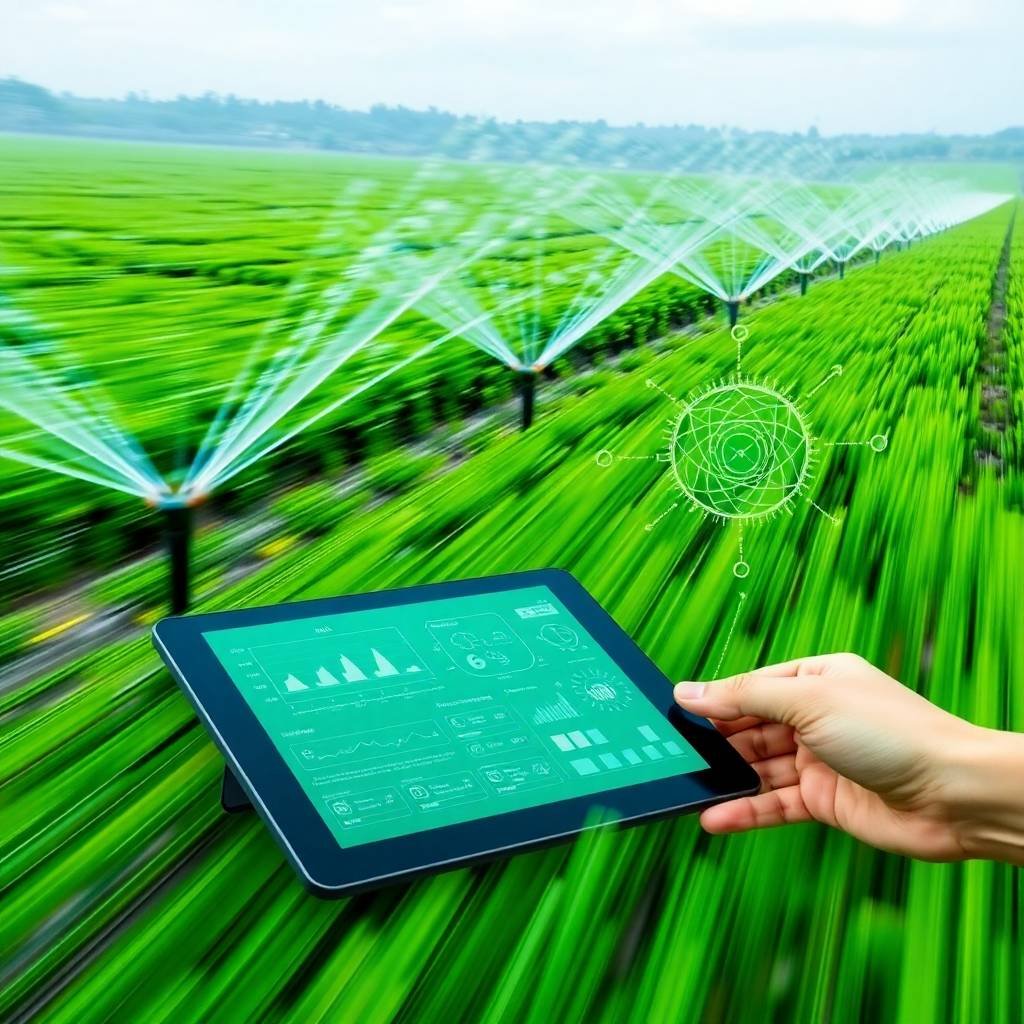Introduction: Revolutionizing Agriculture with Smart Irrigation
Efficient water management is one of the biggest challenges facing modern agriculture today. With the growing concerns over water scarcity and the increasing demand for food production, farmers must find innovative ways to optimize irrigation practices. Artificial Intelligence (AI) has emerged as a powerful tool in this realm, enabling smart irrigation systems that use data-driven insights to conserve water and improve crop yields. By analyzing real-time environmental data and predicting crop water needs, AI-powered irrigation solutions help farmers make precise and timely watering decisions, transforming traditional agriculture into a high-tech, sustainable industry.
How Smart Irrigation Systems Work
The Core Components of a Smart Irrigation System
Smart irrigation systems rely on a network of sensors, controllers, and communication devices. Soil moisture sensors measure the water content in the soil, weather stations provide real-time climate data, and flow meters monitor water usage. These devices feed data to an AI-powered controller that processes the information to determine the optimal irrigation schedule.
Role of AI in Data Analysis and Decision Making
AI algorithms analyze historical and real-time data including soil moisture levels, weather forecasts, and crop water requirements. Using machine learning, the system predicts when and how much water the crops need, automating irrigation with precision. This reduces overwatering and underwatering, ensuring efficient water use and healthier crops.
Benefits of AI in Smart Irrigation
Precision Water Management
AI-driven smart irrigation systems deliver water precisely where and when it is needed. By continuously analyzing soil and weather data, these systems avoid water wastage and reduce runoff, promoting responsible water usage.
Increased Crop Yield and Quality
Maintaining optimal moisture levels enhances plant health, leading to improved crop yields and better-quality produce. AI ensures crops receive just the right amount of water, reducing stress and susceptibility to diseases.
Cost Savings and Sustainability
Automated irrigation reduces labor costs and water bills. Additionally, efficient water use contributes to sustainability goals by conserving a vital natural resource and minimizing environmental impact.
AI Technologies Driving Smart Irrigation
Machine Learning for Predictive Irrigation
Machine learning algorithms analyze vast datasets of soil conditions, weather patterns, and crop growth to predict future irrigation needs. These predictions allow systems to proactively schedule watering, improving efficiency and crop health.
Computer Vision and Crop Monitoring
AI-powered drones and cameras monitor crop conditions visually. By detecting signs of stress or pest infestation early, these technologies help tailor irrigation and other interventions precisely where they’re needed.
Integration with IoT and Cloud Computing
Smart irrigation systems connect to the Internet of Things (IoT), allowing seamless data collection from multiple sensors. Cloud computing platforms process and analyze this data in real time, enabling farmers to remotely monitor and control irrigation through user-friendly apps.
Challenges in Implementing AI-Powered Irrigation
High Initial Investment
The cost of installing AI-enabled sensors, controllers, and communication infrastructure can be significant, especially for small-scale farmers. While prices are dropping, upfront expenses remain a barrier to widespread adoption.
Technical Expertise and Training
Operating smart irrigation systems requires some digital literacy and technical knowledge. Farmers may need training and ongoing support to maximize the benefits of AI technologies.
Data Quality and Connectivity Issues
Reliable internet connectivity and high-quality sensor data are essential for AI accuracy. In remote or underdeveloped regions, inconsistent network access and faulty sensors can limit system effectiveness.
The Future of AI in Smart Irrigation
Advanced Sensors and Real-Time Adaptability
Future smart irrigation systems will feature more advanced sensors capable of detecting a wider range of soil and environmental parameters. Combined with AI’s real-time data processing, these systems will dynamically adapt irrigation strategies to unexpected changes, such as sudden weather shifts or pest outbreaks.
Integration with Climate-Resilient Farming
As climate change impacts become more pronounced, AI-powered irrigation will play a crucial role in developing climate-resilient agriculture. By optimizing water use during droughts and managing excess water during floods, smart irrigation systems will help safeguard crops and ensure food security.
Scalable and Affordable Solutions
Innovations in AI and IoT are making smart irrigation technologies more affordable and scalable. This will enable wider adoption among small and medium-sized farms, democratizing access to efficient water management tools.
Conclusion: AI as a Catalyst for Efficient and Sustainable Irrigation
Artificial Intelligence is transforming traditional irrigation into a smart, data-driven process that maximizes water efficiency and supports sustainable agriculture. By precisely matching water supply to crop needs, AI-powered irrigation systems help farmers reduce costs, boost yields, and conserve precious water resources. As technology continues to advance, smart irrigation will become an essential tool in addressing global food security and environmental challenges, paving the way for a greener, more resilient future in farming.

